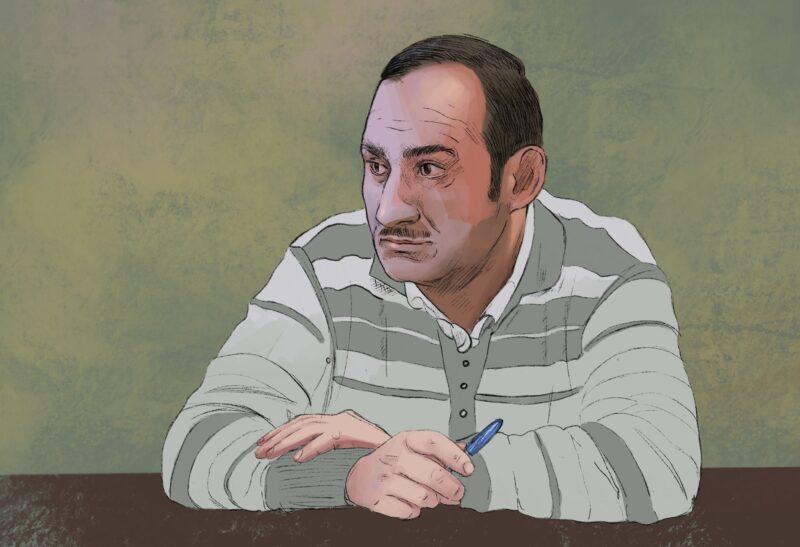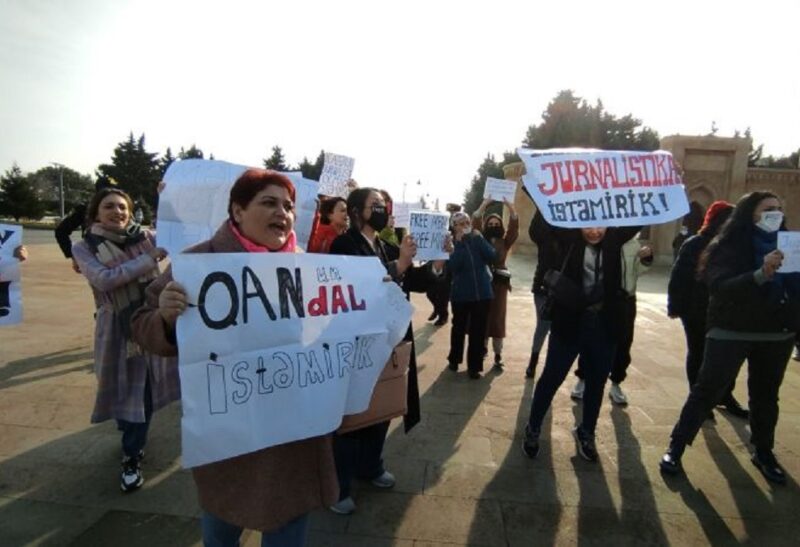

Since I’ve been locked up, I have met all kinds of people. I’ve talked to every one of them, and each was different in his own way. But of all those I’ve met since March 2013, the one I remember best of all is a lad called Umid [the word “umid” means “hope” in Azerbaijani].
It was my third day in the cell. It was dull, and there was nothing to do – what can you do in a prison cell? I was lost in thought for hours on end, thinking about who the cell’s next occupant would be, and about what would happen next. Deep in thought, I felt my heart constricting.
It was then that Umid appeared. His story made me forget my own hopeless situation. He was very open and had a natural simplicity. He hadn’t been contaminated by the dirt of humanity.
He was arrested in 2013 on a drugs charge. I had about 20 cellmates after Umid, but none affected me as much as he did. I spent a mere three days with him and in that time I tried to teach him as much as I could. But sadly there wasn’t a lot of time. His biggest dream was to spend more time with me in that cell. When we parted, both of us could barely hold back the tears.
Umid was born in 1991 in the village of Sabir in the Shamakhi district. He might as well never have been to school. He was almost illiterate and could barely read the alphabet. But he was a very strong young man with an iron constitution. He could handle firearms from the age of eight or nine and carried a hunting rifle. Hunting in the mountains at the age of 14, he shot three wolves.
His father was mentally ill and his condition worsened at the end of the 1990s. The family was left without a breadwinner and had to sell all their land and livestock.
In 2009 Umid was conscripted into the army, and did his military service in a frontier zone. He was awarded several certificates for good service.
He told me how he was inspired by Mubariz [Mubariz Ibrahim, Azerbaijani soldier killed in a clash with Armenian forces in 2010 and awarded National Hero status] and wanted to be like him. When I asked him what he would do if an Armenian appeared in front of him, he said he did not know – he’d never thought about it. He did not trouble his mind with thinking as a general rule; he relied on his muscles.
In October 2010 he was demobbed and came back home. As he had few financial resources, he went to Moscow to earn some money. He was working with a man from his village he called “uncle”. But he had to return to Azerbaijan when they closed down the Cherkizovsky Market in Moscow.
He worked as a waiter in a restaurant for a while, and he got engaged. Short of money, he made several trips to Baku to do casual work on building sites. In March 2013, he was back in Baku working as a porter in the Keshle district. He described how at his workplace, the son of some oligarch was creaming off 100,000 manats a day from the business.
On March 29, 2013, he arrived there in the hope of being hired. But by lunchtime he realised he was not going to get taken on, so he went into central Baku and sat down on a bench to watch the passers-by. A man came up to him, sat down beside him and they started talking about this and that. Eventually the man offered him a job that would make him 600 manats. All he had to do was take a packet of marijuana to a particular address. With no money in his pockets, Umid agreed to do it. But he had only got a few metres with the packet when police officers approached him and detained him, and then took him away in their car.
Questioned at the police station, Umid described what had happened. The police took the marijuana as evidence. He was assigned a state lawyer, whose sole defence argument in court was “why destroy this boy’s life?” Umid was sentenced to three months in jail under articles 234.4.3 and 234.4.1 of the Criminal Code. One of Umid’s friends told him he knew the man who had set him up – he was a policeman.
Is Umid a criminal? Yes, according to the law. But what about people who encourage people like him to commit an offence just to earn a crust of bread?
I don’t know where Umid is now or what happened to him. He had no one to offer him legal advice so he may have ended up with a longer sentence of seven or eight years. I am sure that if he is locked up, he is so naïve that he will end up broken, physically or psychologically.
My only hope is that Umid will be able to keep to a promise he made me that he would never change or lose his innocence, and never be besmirched by the evils of this world.



